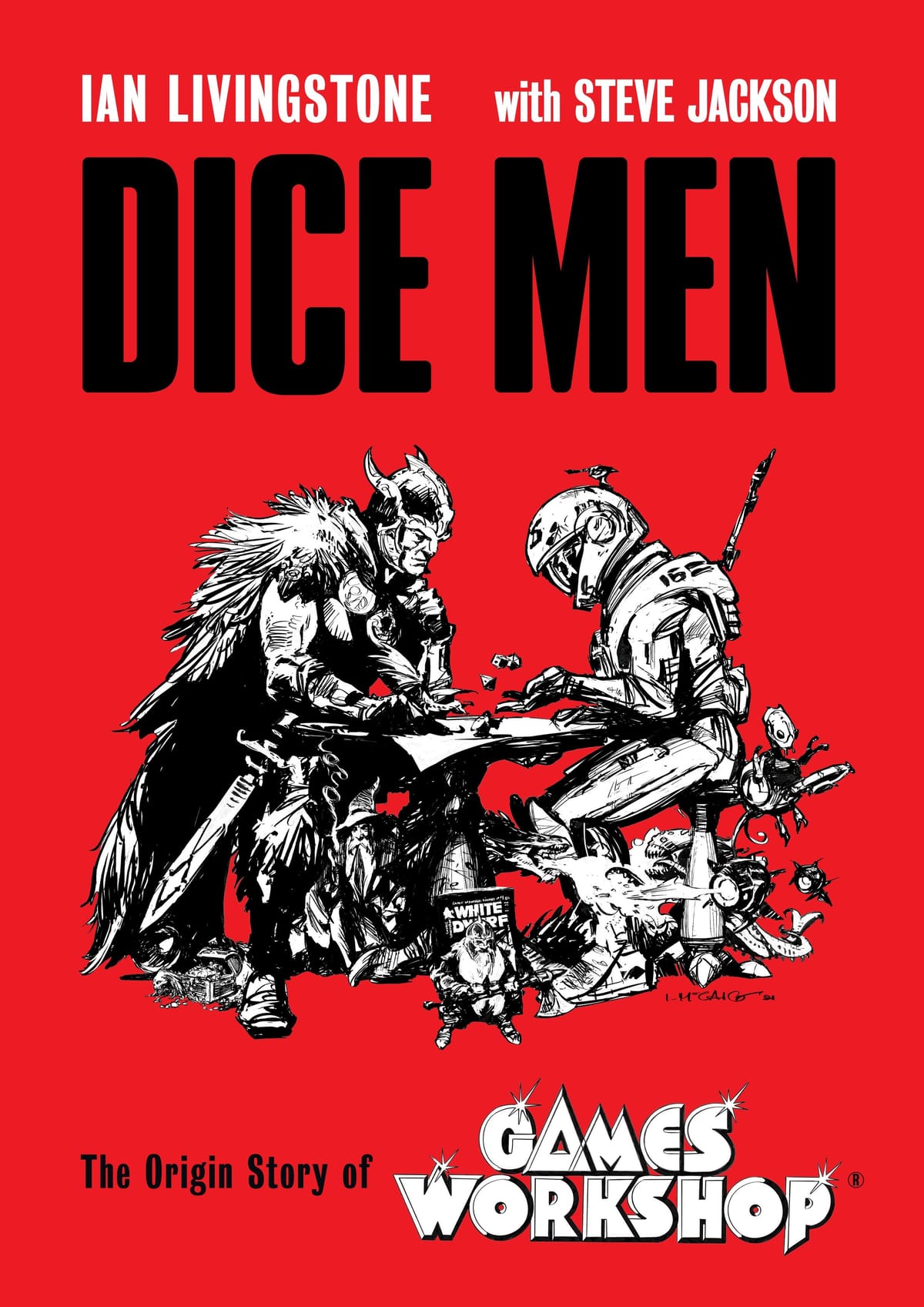
In recent years the likes of Jon Peterson, Ben Riggs and Shannon Appelcline have all done great work documenting the chaotic origins of both America’s RPG scene and TSR, the company responsible for so much of it. Despite the many parallels, the UK and its own gaming giant, Games Workshop, is sadly yet to receive the same treatment. Dice Men then is a start, of sorts, being the ‘origin story’ of Games Workshop as told by two of its three founders, Ian Livingstone and Steve Jackson.
Those, such as myself, longing for a forensic dissection of the company’s early years though will need to wait a while longer still. Whilst the book takes us from the company’s beginning in a dingy West London flat right up to the point their business partner orchestrated their departure from the company in the early 90s, the intervening story is told in fairly broad strokes. Livingstone, and this is his book really, is a consummate story-teller, and many of the tales in this book have the well worn feel of ones that have been told many a time at the end of enjoyable dinners down the years, all their rough edges buffed away in the re-telling.
That’s not to say there’s nothing of value here, Livingstone can spin a decent yarn after all and if you’re of a certain age and spent your youth with your nose in a copy of White Dwarf or a Fighting Fantasy book then Dice Men will be a little like a warm, comforting blanket in hardback form. It is also filled with a veritable dragon’s hoard of photos, pictures of early promotional material and handwritten notes culled from the founder’s personal collections, most of which have probably not been seen for the best part of four decades.
Taking Livingstone at his word then the story of Games Workshop’s early years is one of almost remarkable serendipity. Having decided to start a company selling games from their flat, they stumbled across Dungeons & Dragons at a board game convention in early 1975 and, falling in love with the game, ordered a whole six copies for their nascent mail order business. Off the back of this improbably small order TSR granted Games Workshop the exclusive European distribution rights to the game.
Time and time again Livingstone and Jackson appear to be in the right place, or meet the right person at the right time and something epochal just happens. It’s remarkable that for a company that gave us games like Warhammer just how bloodless much of its history appears to be. Whilst the early days of TSR seemed to be a frenetic mess of battling egos, Games Workshop’s first decade, if hap-hazard in places, would appear to have been a much more relaxed, indeed pleasant, affair for all concerned.
Not that they necessarily had it easy, and from sleeping in a van and using a local squash club as their bathroom to their first road trip to meet Gary Gygax and the TSR team they were clearly operating on a shoe-string, but honestly in the way that Livingstone tells it, it all sounds like rather good fun.
Even when trouble does turn up, most often in the surly shape of Citadel Miniatures’ Bryan Ansell, Livingstone seems remarkably even handed. Anyone who felt betrayed by Games Workshop’s abandonment of roleplaying games in favour of cash cow Warhammer and have nurtured a dislike of Ansell ever since will be disappointed. For any disagreements they might have had over the company’s direction Livingstone always seems impressed by, and ultimately supported, Ansell’s sharp elbowed business strategy. It is after all hard to argue with results.
When we do get to the end of the road and Ansell first takes over the running of the company before selling it to Tom Kirby, ending Livingstone and Jackson’s relationship with the company they founded, the whole affair’s done and dusted in less than a page.
I suspect much of this equanimity is due to Livingstone’s many successes beyond founding Games Workshop. For most of us that would be the pinnacle of our lives, for Livingstone it was just the start of a career that would include creating Fighting Fantasy, running the company that gave the world Lara Croft, advising governments, being knighted -notably for his services to the online gaming industry rather than the tabletop world- and, to cap it all, four decades later he’s still enjoying regular game nights with his childhood friend Jackson. It’s a life well lived, to be sure.
Still, if Dice Men does in some way present a sanitised and abbreviated account of Games Workshop’s early years I suspect that much of the intended audience will be more than happy enough with that and will just enjoy the chance to spend a few hours immersing themselves in the company of the men who have given so many of us so much joy over the years.
Authors: Ian Livingstone with Steve Jackson
Published by Unbound
This feature originally appeared in Wyrd Science Vol.1, Issue 4 (April '23)

